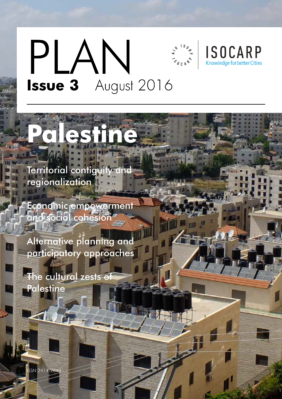UPAT PLAN 3_Palestine  Spatial Planning in Palestine
Spatial Planning in Palestine
The United Nations Development Programme (UNDP/PAPP), UN-Habitat and the International Society of City and Regional Planners (ISOCARP) launched the third edition of the Spatial Visioning Reflections magazine, with a special focus on Palestine.
The third edition of ISOCARP’s PLAN magazine is the last of a series of three which aim to convey the experiences and ideas of two Urban Planning Advisory Teams (UPAT) who visited Gaza and the West Bank in June 2015. In close collaboration with local actors and stakeholders, the two teams simultaneously tried to envision possible urban futures – that look beyond the present situation and acknowledge the borders of 1967 as fully open for travel and trade, and – that might exist in a future State of Palestine.
The once in a lifetime opportunity to be a part of the UPAT workshops on Capacity Building and Test Planning Exercises for the West Bank and Gaza is probably one of the most rewarding experiences one can get. To complement this, despite the overwhelmingly harsh conditions of occupation, the enthusiasm and positive attitude of local Palestinians we worked with was a big source of motivation for the UPAT teams. People from different backgrounds were brought together for workshops and discussions with an aim to create much needed new approaches to ensure the future viability and wellbeing of the communities and cities of West Bank and Gaza.
The decision to convey the outputs of our UPATs in a series of magazines with topics ranging from regionalisation and economic empowerment to social cohesion and culture has turned out to be an innovative way to attract readers from diverse backgrounds. The variety of the articles show that the magazine has been created together with a wonderful team, composed of urbanists from Palestine and from all over the world, brought together by ISOCARP. A special thanks to the editorial team, all the contributors and the UNDP and UN-Habitat for their cooperation and enduring hard work. On behalf of the editorial team, I invite you to enjoy the magazine and hope that it contributes to Palestinian national planning policies and reconstruction efforts.
Gizem Caner, editor